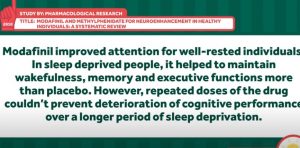 What Are They?
What Are They?
They are drugs used by people in a bid to boost their memory, their mental vigilance and concentration as well as enhance their energy levels and combat insomnia. They are also referred to as smart drugs, memory boosters, brain boosters, drive drugs, nootropics or neuro-enhancers.
There are various types of cognitive enhancers. There are some which are pharmaceutical drugs that are manufactured to treat conditions like narcolepsy or insomnia and to boost the concentration and focus of people with attention disorders. But in many cases, healthy people abuse these drugs in a bid to increase their cognitive performance.
In the short term, many abusers think that the cognitive enhancers they use can be useful in masking things such as fatigue, boredom, procrastination, sleeping difficulties. They neither make people intelligent nor active.
How They Work
Research indicates that cognitive enhancers work on the different systems within the body concurrently. They are argued to boost the flow of blood to the brain thus allowing the brain to use more oxygen.
Some of the brain boosters also raise the adrenalin levels in the body and yield effects alike to imbibing large amounts of caffeine. This means that someone can actually stay awake for protracted periods of times.
Some of the drive drugs cause an upsurge in the number of certain chemicals like dopamine that is released in the part of the brain associated dependency.

Types of Cognitive Enhancers
• Prescription drugs: They include drugs like modafinil and armodafinil. They are used to treat narcolepsy, obstructive sleep apnea that causes breathing difficulties during sleep, and shift work sleep syndrome. They both encourage restlessness and vigilance and helps in treating stimulant withdrawal issues. They are normally subject to certain legislation and usually attract some penalties for their illegal supply and use
• Psychostimulant medications: They include drugs such as dexamfetamine, methylphenidate, and lisdexamfetamine. They were extensively used to treat Attention Deficit Hypersensitive Disorder-ADHD in kids in the 1990s. It is now widely used as a psychotropic medication for kids to treat restlessness, impulse, and inattention.
• Nootropics: They are substances not described by the doctor i.e. caffeine, herbal medicaments, and vitamins. They mostly function as stimulants that boost attention and heart rate of the users. Some like Vitamin B helps in maintaining the neurons which act as the brain cells thus fostering cognitive role
• Smart Drugs: They are prescribed by the doctors for medical conditions that impede the mental function and concentration in general. They include drugs like Ritalin and Adderall which are mostly used to enhance the cerebral function in persons with Attention Deficit Hyperactivity Disorder (ADHD). They also function by stimulating the central nervous system and improve focus. Mainly used by students when studying
Side Effects
No drug is safe when taken in whatever quantity. Like other drugs, cognitive enhancers carries some risks. Some of the major side effects of these drugs include:
- Aggression and mistrust
- Jubilation and a heightened sense of security
- Increased body temperature, blood pressure, and respiration
- Augmented sex drive
- System failure of cardiovascular
- Widened pupils, dry mouth, nausea, and headaches
- Chest pains
- General dizziness
- Frequent nausea
- Lack of sleep
- Apprehension
- Reduced exhaustion and appetite
Long-term side effects
- Frequent use of consistent use of these drugs may lead to the following:
- Malnutrition and stomach ulcers
- Behavioral problems emanating from mental health
- Difficulty in breathing and dizziness
- General weakness and fatigue
- Skin disorders manifested in the form of pale or flushed skin
- Monotonous physical actions
- Irregular heartbeat, high blood pressure, and possible inflammation of the heart valves
- Convulsions, death or coma in severe cases
Safer Options
The ideal option for these substances would supplement such as fish oil, vitamin B and herbal supplements like extracts of Bacopa monnieri and Gingko Biloba. They are a much safer option compared to pharmaceutical drugs to enhance cognitive performance. The benefits may not be effective immediately but the effects are actually longer lasting. They are actually much more beneficial than cognitive enhancers so you should try them out for the best results.
In a nutshell, the widespread use of cognitive enhancers by healthy people could have a substantial impact on health, economic, social, ethical and regulatory fronts. The absence of concrete regulatory mechanisms coupled with increasing social pressure and commercial supply have increased the supply and use of these drugs.